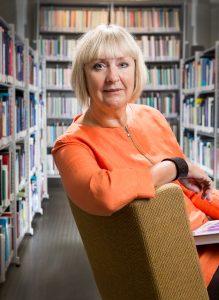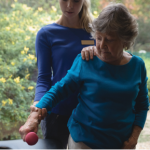CHICAGO—Christina H. Opava, PhD, RPT, is the recipient of the 2018 ARHP Lifetime Achievement Award, which was presented (along with the other ACR and ARHP awards) during the opening session of the 2018 ACR/ARHP Annual Meeting on Oct. 20. “Receiving this award is an immense honor,” she tells The Rheumatologist. “My first thought was that there are so many others who deserve it, but I have to forget that and just be happy that my work is being recognized. It’s a real joy.”
The highest honor that the ARHP bestows, the Lifetime Achievement Award is presented to a current or former member of ARHP whose career has demonstrated a sustained and lasting contribution to the field of rheumatology and rheumatology health professionals.
Dr. Opava graduated as a physical therapist from Lund University in 1978 and then held clinical physical therapist positions until 1993, when she earned her PhD from Karolinska Institutet. She has since been employed at the Department/Division of Physical Therapy, Karolinska Institutet, where she became an associate professor in 1999 and a full professor in 2006. Her academic position is joined with one at the Rheumatology Clinic, Karolinska University Hospital. She is the current director of the Strategic Research Area Health Care Science at Karolinska Institutet and Umeå University.
Dr. Opava formed her research team focusing on physical activity and health in rheumatic disease in 1999. One important aspect of her work is the development, evaluation and implementation of clinical trials of exercise and physical activity interventions. She has been a pioneer in testing various models of exercise delivery from one-on-one counseling to Internet-based interventions using efficacy and effectiveness study designs. Dr. Opava’s publication record lists more than 100 scientific publications, including peer-reviewed original and review papers, short reports and textbook chapters, the majority with her as the first or senior author.
Dr. Opava has been an ARHP member since 1993, shortly after attending her first ACR/ARHP Annual Scientific Meeting in Atlanta in 1992, when she was a fourth-year PhD student. At that first meeting, she started building a network of colleagues and friends that inspired her and became the impetus for her to remain an engaged member all these years later. She was invited to the President’s Reception. And she remembers visiting the Coca-Cola Museum with her new American friends. She credits her membership in the ARHP with helping her create a “really good network of American colleagues. I’ve made great colleagues, great friends.”
Those friendships have kept her coming back to the Annual Meeting about every other year. She says, “We talk about research, teaching, clinics and our families. Many have visited Stockholm, and know my husband and my two sons. We’ve had a lot of fun over the years.”
In the early 1990s, the ARHP was the only organization that was reaching out to rheumatology health professionals. Today, EULAR devotes a vice president position to a health professional, a position Dr. Opava filled from 2013–2017. During that time she initiated the first formal collaboration between EULAR health professionals and ARHP on recommendations for the health professional’s approach to pain management in arthritis.
Dr. Opava received the ARHP distinguished Scholar Award in 2002 and the Ann Kunkel Advocacy Award in 2016, both milestones in her career.
Dr. Opava says membership in the ARHP taught her how to socialize with people from other countries. “It gave me confidence in that skill.”
Dr. Opava has supervised 11 PhD students to graduation and has performed extensive teaching at all levels at 15 universities in Sweden and other European countries, in America and in Asia. “Christina is inspiring and knowledgeable. She is the guru,” says Helene Alexanderson, RPT, associate professor, Karolinska Institutet, Sweden, and a former student of Dr. Opava. “She is one of the three people I have as a role model,” Dr. Alexanderson continues.
So what’s next for Dr. Opava? She’s helping plan a new series of studies that will focus on pain and lifestyle, including physical activity and diet. “Lifestyle has become an increasingly important focus for research,” she says. The plan is to start with qualitative interviews, then move on to registry-based studies and finally interventional studies. She’s working with a former PhD student to whom she plans to hand off the reins when she retires next year.
“I’ve done my part,” says Dr. Opava. “It’s time I give it over to the next generation.”
Dr. Opava is looking forward to focusing on interests and priorities outside work, such as livening up her exercise routine with bicycling and dancing. She may also move out of Stockholm and back to the southern edge of Sweden where she grew up.
She hopes people will remember that “I am a good person. Research is important, but being a good person is more important.” She pauses for a moment and says, “I hope they remember that I was fun, too.”
Keri Losavio is the editor of The Rheumatologist.
Note: Look for interviews with the other ACR and ARHP award winners in the November and December issues of The Rheumatologist.




